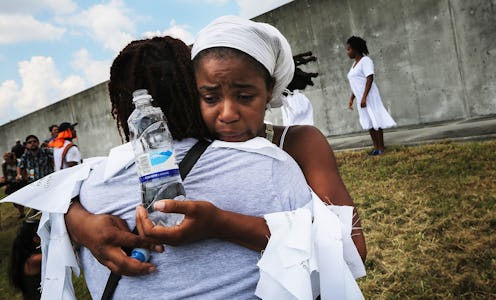News
How Hurricane Katrina Survivors Are Still Affected
Eleven years have passed since Hurricane Katrina hit the Gulf region of the United States and New Orleans in particular. The hurricane, which started on Aug. 23, 2005, and lasted through Aug. 31, 2005, left thousands of homes destroyed and damaged, displacing more than one million people. Hundreds of thousands of people lost access to their homes and their jobs; thousands suffered from physical and mental health issues as a result; nearly 2,000 people were killed. The country has since moved on, but this video shares the stories of people whose everyday lives remain affected by Katrina, even after 11 years.
In the video, Harold Clay, Jr., the head of Edna Karr high school, shared: "I know that some folk think it's eleven years later and that we should just be beyond it, but how do you get beyond PTSD? I have kids who still suffer from when the weather changes." It's a privilege that anyone near or far can move on from Katrina. For many, it's out of sight and out of mind. Some people may have been able to rebuild their lives afterward, but the effects of Katrina — economic, social, mental and physical — have had a deeper impact on the lives of many.
The anniversary of Katrina requires both critical discussion and action concerning the communities most affected by its devastation — namely black middle-class Americans — rather than perpetuating the erasure of how various communities were affected in different ways. You can watch the entire video below:
Emanuel, 16, shared with The Huffington Post how Katrina's devastation and impact were heartbreaking, noting, "A lot of my friends were 5 and 6 years old when all of this happened. So it's kinda like we're traumatized. ... Those memories still live with us." Amy Goodman of Democracy Now! suggested that those thousands of displaced people after Katrina — whether they sought refuge in the Superdome, or were forced to relocate to different cities as some of the students in the Huffington Post video described — should be considered climate refugees.
Black and low-income communities continue to feel the impacts of Katrina even now, as many are still rebuilding their lives, and many are still displaced. The individuals and families that were disproportionately affected by Katrina's devastation are black and low-income communities, just like the families who are still facing a water contamination crisis in Michigan. It is increasingly important to acknowledge and unpack the connections between environmental crises and systemic racism, even 11 years after Hurricane Katrina. Without doing so, we are allowing similar environmental disasters to continue to impact these communities.
